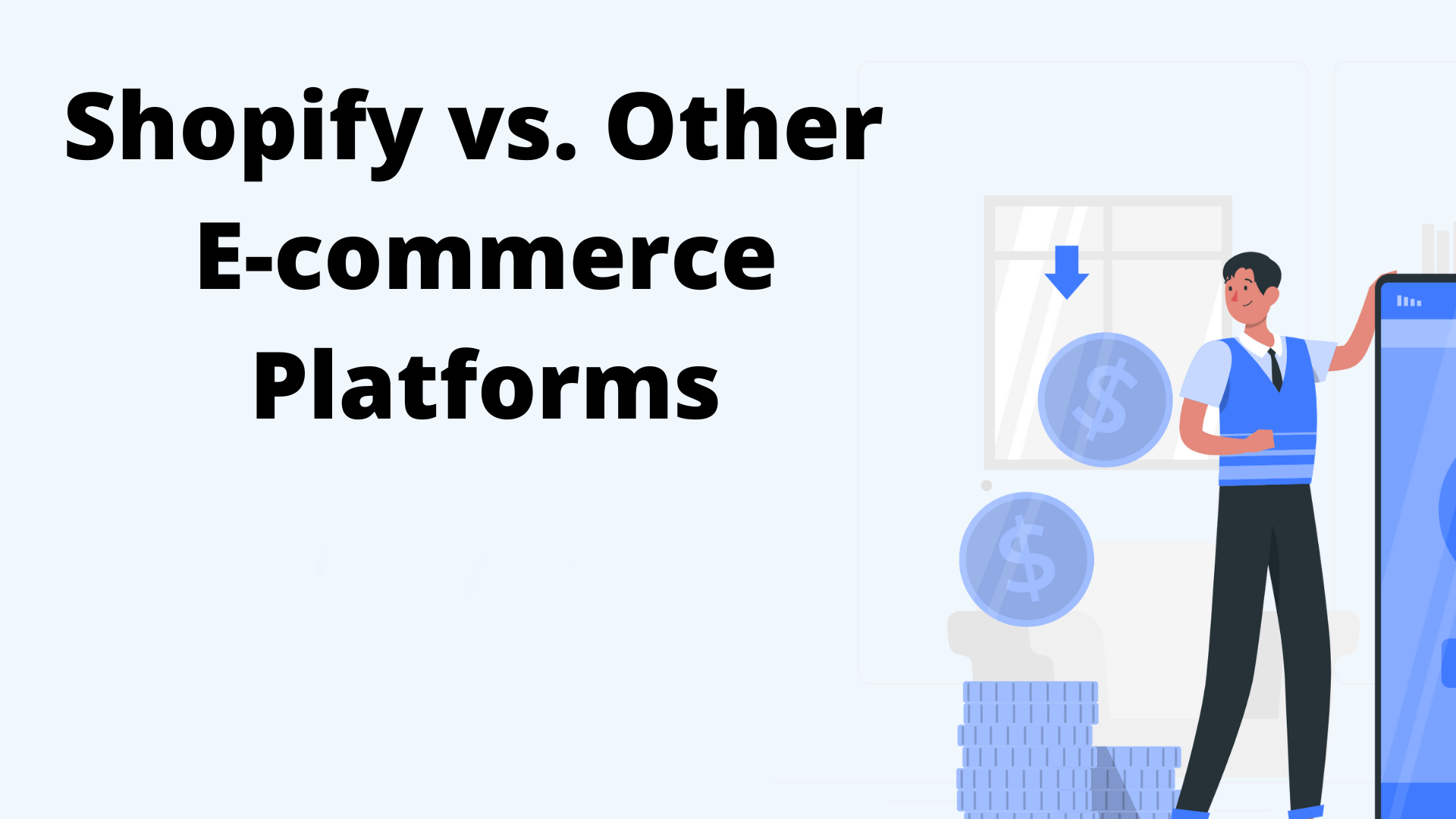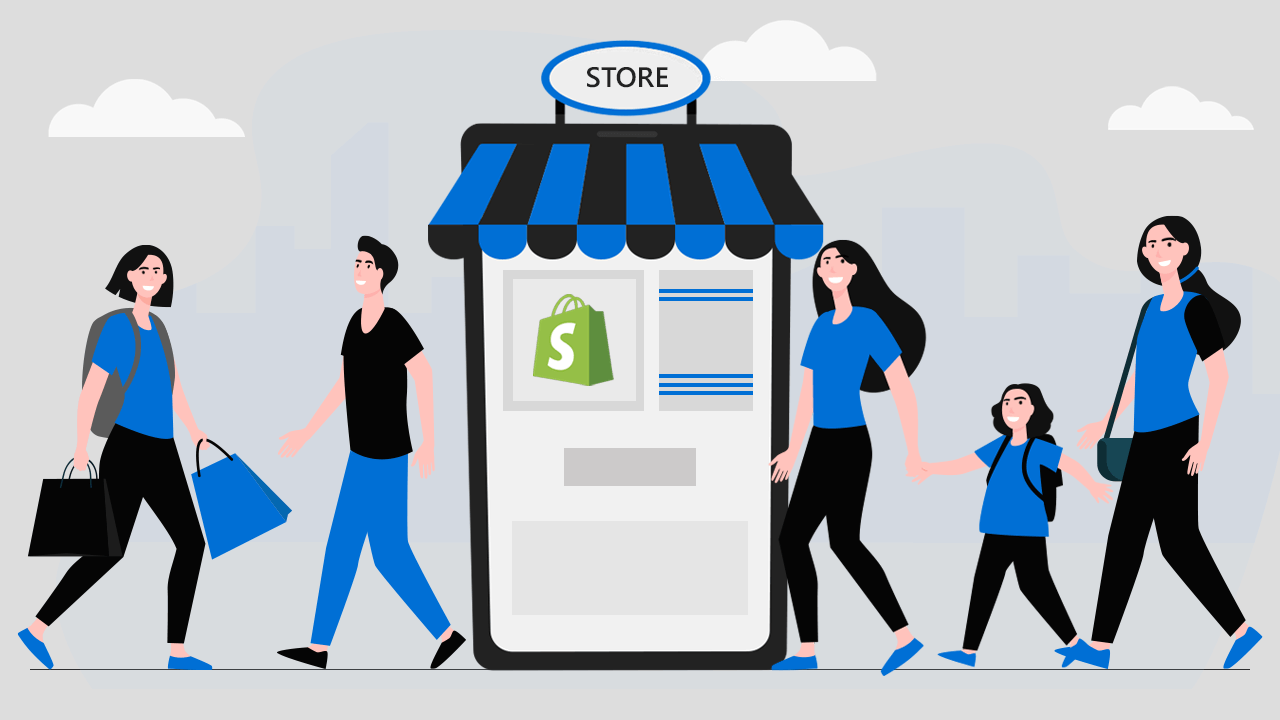
Shopify is an all-in-one e-commerce platform that allows businesses to create and manage their online stores. With a wide range of advanced features and a user-friendly interface, Shopify provides an ideal solution for individuals and small to medium-sized businesses looking to establish a professional and successful online presence. Users can create customized online stores, manage product catalogs, process online payments, and take advantage of marketing features such as cart recovery and built-in blogs. Additionally, Shopify offers a variety of pricing plans to suit different budget requirements, with options for monthly subscription plans as well as more expensive plans for larger businesses. With its seamless integration with third-party apps and its extensive range of themes, Shopify provides a flexible and scalable platform for online businesses to grow and succeed.
What are other e-commerce platforms?
Other e-commerce platforms that exist in the market besides Shopify include Magento, PrestaShop, VirtueMart, Zen Cart, and osCommerce
Magento is a widely used open-source platform known for its scalability and advanced features. It offers a range of themes and plugins for customization.
PrestaShop is another popular e-commerce platform that is known for its user-friendly interface and wide range of features. It offers a variety of customizable themes and a robust back-end system.
VirtueMart is an extension for the Joomla content management system. It is suitable for small to medium-sized businesses and offers features such as inventory management and multiple payment options.
Zen Cart is an open-source platform that is highly customizable and user-friendly. It includes features like product catalog management, built-in blog, and multiple payment methods.
osCommerce is one of the oldest e-commerce platforms available. It offers a range of features such as product management, secure payment gateways, and multiple shipping options.
These e-commerce platforms provide different options for businesses looking to set up online stores. Each platform has its own set of features and benefits, allowing users to choose based on their specific needs and technical skills.
Overview of Shopify
Shopify is one of the most popular and widely used e-commerce platforms available today. It has gained immense popularity due to its user-friendly interface, advanced features, and robust functionality. With Shopify, users can easily create and customize their online stores without any technical skills. It offers a wide range of themes and templates that are responsive and visually appealing. Moreover, Shopify provides a seamless integration with various third-party apps and tools, enabling users to add additional features and functionalities to their online stores. It also offers built-in blogs, marketing features, and cart recovery options for effective customer engagement and conversion. Shopify also supports multiple payment methods and provides secure payment gateways for smooth transactions. In addition, it offers an extensive range of pricing plans catering to different business needs and budgets. Overall, Shopify is a comprehensive and reliable e-commerce platform that empowers businesses to create professional online stores with ease and efficiency.
Transaction Fees
When it comes to transaction fees, Shopify and Magento offer different options for ecommerce merchants.
Shopify has its own payment gateway called Shopify Payments, which supports various payment methods such as credit cards, Apple Pay, and Google Pay. If you choose to use Shopify Payments, there are no additional transaction fees. However, if you decide to use a third-party payment gateway like PayPal or Stripe, additional fees ranging from 0.5% to 2% will apply on top of the regular transaction fees.
On the other hand, Magento is an open-source platform that allows merchants to choose their own preferred payment gateway. Popular options include PayPal, Braintree, and Authorize.net. Transaction fees for these payment gateways will vary, depending on the provider and the specific plan chosen.
It's important to note that while Shopify offers seamless integration with their own payment gateway, Magento provides more flexibility in terms of payment options. Merchants using Magento can negotiate transaction fees directly with their chosen payment providers.
In conclusion, Shopify's transaction fees depend on the payment gateway used, while Magento allows merchants to select their preferred payment gateway and negotiate fees accordingly. Both platforms offer competitive options for e-commerce businesses, but the choice ultimately depends on the specific needs and preferences of each merchant.

Unlimited Products
In terms of unlimited product capabilities, BigCommerce has an advantage over Shopify. While Shopify imposes limits on the number of products you can have, BigCommerce allows for unlimited products to be listed on your online store. This means that businesses with extensive product catalogs can benefit from BigCommerce's flexibility and scalability.
Additionally, BigCommerce excels in handling products with numerous options and variants. It supports larger lists of product options and variants, making it more suitable for businesses selling products with a high number of configuration options. This is particularly beneficial for industries like fashion, electronics, or customizable products, where customers may have specific preferences or requirements.
On the other hand, Shopify has limitations regarding product options and variants. It only allows for three sets of configuration options per product and a maximum of 100 combinations of variants. This means that if your business requires more complex product configurations or a greater number of variants, Shopify may not meet your needs as effectively as BigCommerce.
In summary, BigCommerce offers the advantage of unlimited products and robust support for extensive product options and variants. On the other hand, Shopify has some limitations in terms of the number of product options and variants it can handle. Businesses with large catalogs and complex product configurations may find BigCommerce to be a more suitable choice for their e-commerce needs.
Online Stores & Cart Recovery
When it comes to online store features, Shopify and other e-commerce platforms offer a range of capabilities to help businesses succeed in the competitive world of online selling. One key feature that merchants look for is cart recovery, which allows them to target and recapture potential customers who abandoned their carts before completing a purchase.
Shopify provides a robust cart recovery feature that is built-in to their platform, making it easy for merchants to re-engage with these potential customers. By capturing and storing customer email addresses during the checkout process, Shopify can automatically send follow-up email reminders to encourage customers to complete their purchase. This feature can significantly increase conversion rates and boost sales.
However, it's worth noting that while some platforms, like BigCommerce, offer built-in options for cart-level discounts and coupon codes, Shopify relies on third-party apps for discount functionality in the shopping cart. This means that merchants using Shopify may need to explore and install additional apps to offer discounts and promotional offers to their customers.
In terms of integrations with popular online shopping platforms and marketplaces, both Shopify and Squarespace offer seamless connections. Shopify integrates seamlessly with popular platforms like Amazon, eBay, and Etsy, allowing businesses to reach more customers and expand their online presence. Squarespace, on the other hand, offers integrations with marketplaces like Instagram, allowing businesses to sell products directly on social media.
In conclusion, Shopify and other e-commerce platforms provide a range of features, including cart recovery, to help businesses optimize their online stores. While Shopify relies on third-party apps for discount functionality, BigCommerce offers built-in options. Additionally, both Shopify and Squarespace offer integrations with popular online shopping platforms and marketplaces, allowing businesses to expand their reach and increase sales.
Range of Themes, Custom Domain & Blog Post
One of the key advantages of using Shopify as an e-commerce platform is its wide range of themes. Shopify offers hundreds of professionally designed themes that cater to different industries and business types. From minimalist and modern designs to bold and vibrant layouts, merchants can easily find a theme that matches their brand aesthetics and attracts their target audience. These themes are also responsive, meaning they adapt seamlessly to different screen sizes, ensuring a user-friendly experience for customers on mobile devices.
In terms of customizability, Shopify allows users to fully personalize their online stores by offering a custom domain feature. This means that businesses can use their own unique domain names (e.g., www.mybusiness.com) instead of a generic domain provided by Shopify. Having a custom domain adds credibility and enhances a brand's presence in the online marketplace.
When it comes to blogging, Shopify provides basic blogging features that enable businesses to create and publish blog posts directly on their online stores. Merchants can easily add and format text, images, and videos, and also schedule posts in advance. Users can also engage with readers through comments on their blog posts. Additionally, there are third-party apps available in the Shopify App Store that offer additional blogging features such as advanced SEO optimization, social sharing options, and newsletter signup integration, allowing businesses to enhance their blog content and reach a wider audience.
Wide Range of Advanced Features
When it comes to advanced features, Shopify is a well-rounded e-commerce platform. However, other platforms also offer a wide range of advanced features that make them attractive options for businesses.
One such platform is Squarespace, which provides a strong inventory system. This allows businesses to effectively manage their product catalogs, including tracking stock levels and organizing products into categories. Additionally, Squarespace offers the flexibility to sell both digital and physical products, making it suitable for a variety of businesses. Moreover, Squarespace allows users to monetize their website through ads by integrating with Google AdSense, providing an additional revenue stream.
Another platform worth mentioning is Bigcommerce, known for its advanced product option functionality. Unlike Shopify, which allows for only 3 sets of configuration options and 100 total combinations of variants, Bigcommerce enables businesses to have large lists of options per product. This is particularly useful for businesses that offer customizable products or have extensive product variations. This advanced functionality allows for greater flexibility and customization, providing a seamless shopping experience for customers.
While Shopify is a strong e-commerce platform with its own set of advanced features, it's essential to consider alternatives like Squarespace and Bigcommerce to find the platform that best aligns with your business needs and goals.

Monthly Cost & Technical Skills Required
When comparing e-commerce platforms like Shopify and other competitors, it is important to consider factors such as monthly cost and technical skills required.
Shopify offers a range of pricing plans to cater to different business needs. Their basic plan starts at $29 per month, with additional plans available at $79 and $299 per month (Shopify Plus) for more advanced features. This pricing structure allows businesses to choose a plan that aligns with their budget and requirements. Additionally, Shopify is known for its user-friendly interface, making it accessible to beginners with limited technical skills.
On the other hand, other e-commerce platforms also offer various pricing plans with different ranges. For example, Square Online offers plans starting at $0 per month, making it an affordable option for small businesses or those just starting out. Squarespace, known for its beautifully designed and responsive themes, offers plans ranging from $12 to $40 per month, depending on the level of functionality required.
In terms of technical skills required, Shopify is designed to be beginner-friendly, requiring minimal coding or programming knowledge to set up and manage an online store. Other platforms like Square Online and Squarespace also prioritize ease of use, providing intuitive and user-friendly interfaces that do not demand extensive technical expertise.
Considering the monthly cost and technical skills required is essential when choosing an e-commerce platform, as it ensures that businesses can find a solution that fits their budget and resources while still delivering the necessary functionality for effective online selling.
Online Payments & Credit Cards Accepted
When it comes to online payments and accepted credit cards, Shopify and other ecommerce platforms offer a wide range of options to cater to different businesses and their customers.
Shopify supports multiple payment processors, including their own Shopify Payments, Stripe, and PayPal. Shopify Payments is a built-in payment solution that allows merchants to accept credit card payments directly on their online store. It supports various credit cards, such as Visa, Mastercard, American Express, and Discover.
Stripe is a popular third-party payment processor integrated with Shopify, offering a seamless payment experience for customers. It supports a wide range of credit cards, including international ones.
PayPal is another widely used payment option accepted by Shopify and other platforms. It allows customers to pay using their PayPal balance or credit cards linked to their PayPal account.
Regarding transaction fees, Shopify charges additional fees for using payment providers other than Shopify Payments. The transaction fees vary depending on the pricing plan chosen.
In addition to these payment processors, Shopify and other platforms offer the flexibility to integrate with a range of payment gateways. This allows businesses to connect with various payment service providers and offer their customers different payment options.
Ultimately, both Shopify and other e-commerce platforms provide a variety of online payment options and accepted credit cards, ensuring a seamless and convenient checkout process for customers.
Gift Cards, Physical Products & Other Services
Shopify offers a comprehensive set of features and services to support the sale of physical products and the use of gift cards on their platform.
In terms of gift cards, Shopify provides the functionality to create and sell digital or physical gift cards. Merchants can customize the design of their gift cards and set their own denominations. This allows businesses to offer their customers the option to purchase and give gift cards, increasing customer engagement and driving sales.
When it comes to selling physical products, Shopify provides a user-friendly interface for managing inventory, adding product variants (e.g., size or color options), and tracking stock levels. The platform also offers flexible shipping options, allowing merchants to calculate shipping costs based on weight, location, or other factors.
Furthermore, Shopify offers additional services and features that enhance the overall customer experience. For example, they provide integrated customer service tools, such as live chat and email support, to help merchants effectively address customer inquiries and resolve issues.
Shopify also offers advanced reporting and analytics features, allowing businesses to track their sales, monitor customer behavior, and make data-driven decisions. This helps merchants optimize their marketing strategies and improve their overall performance on the platform.
With Shopify's robust set of features and services related to gift cards, physical products, and additional customer services, businesses can efficiently manage their online stores and provide a seamless shopping experience to their customers.
Shopify App Store & Shopify Shipping
In addition to its core features, Shopify offers the Shopify App Store and Shopify Shipping to further enhance the capabilities of its e-commerce platform.
The Shopify App Store is a vast marketplace that provides over 8,000 free and paid apps to help merchants customize and optimize their online stores. These apps cover a wide range of functionalities, from SEO optimization and marketing automation to inventory management and dropshipping. For example, the Avada SEO app can elevate a store's search engine optimization efforts, while the Dsers app streamlines and automates dropshipping processes. With such a diverse selection of apps, merchants can find the tools that best suit their business needs and goals.
Shopify Shipping is another valuable feature that simplifies the shipping process for merchants. It allows seamless integration with multiple carriers, including USPS, DHL, and UPS, enabling merchants to easily compare rates and services. Moreover, Shopify Shipping provides discounted rates for shipping, helping businesses save on shipping costs and provide affordable options to their customers. With this feature, merchants can efficiently manage their shipping operations, ensuring a smooth and reliable delivery experience for their customers.
Both the Shopify App Store and Shopify Shipping offer tremendous benefits to merchants, allowing them to tailor their online stores and streamline their shipping processes. By leveraging these features, businesses can enhance customer satisfaction, improve operational efficiency, and ultimately drive growth in their e-commerce endeavors.
Additional Transaction Fees for Third-Party Apps
When using third-party apps on Shopify, merchants may encounter additional transaction fees. These fees vary depending on the specific app and its functionalities. While many apps in the Shopify App Store offer free plans or have basic pricing structures, some popular apps may come with additional costs.
Factors contributing to these fees include the complexity of the app's features, the level of customization required, and the value it brings to the merchant's business. For example, apps that provide advanced marketing features or extensive data analytics capabilities may charge additional transaction fees.
Popular apps that may have additional costs include Klaviyo for email marketing automation, Bold Upsell for upselling and cross-selling, and ReCharge for subscription management. These apps offer premium features that can significantly enhance a store's performance, but they do come with additional fees to cover the resources and support required to maintain their functionality.
When budgeting for third-party app expenses, merchants should consider several key factors. First, they should assess the importance and value an app brings to their business. They should also evaluate the potential return on investment that the app can generate. Merchants should consider their monthly revenue and projected growth when budgeting for these expenses. Additionally, they should compare the costs of different apps and choose the ones that align with their budget and business needs.
In conclusion, while third-party apps on Shopify offer a wide range of functionalities, merchants should be aware of the potential additional transaction fees associated with using these apps. By carefully considering their budgeting and business requirements, merchants can make informed decisions to optimize their online stores while managing their expenses effectively.

Marketing Features Provided by Shopify
Shopify provides a wide range of marketing features to help merchants effectively promote their online stores and build lasting customer relationships. With built-in tools for email marketing, customizable SEO options, and the ability to integrate with third-party SEO apps, Shopify empowers businesses to optimize their marketing efforts.
One of Shopify's standout marketing features is its built-in email marketing tool. Merchants can easily create and send professional-looking email campaigns to engage with their customers, promote new products, or offer exclusive discounts. This feature helps businesses stay connected with their audience and build brand loyalty.
In addition, Shopify offers customizable SEO options that allow merchants to optimize their online store for search engines. This includes editing meta tags, optimizing URLs, and creating SEO-friendly blog posts. By enhancing their store's visibility in search engine results, merchants can attract more organic traffic and increase their chances of making sales.
Furthermore, Shopify seamlessly integrates with third-party SEO apps for advanced optimization. Merchants can leverage these apps to further enhance their store's visibility and improve their search engine rankings. This flexibility allows businesses to tailor their marketing strategy to their specific needs and preferences.
Overall, Shopify's marketing features provide merchants with the tools they need to effectively promote their online stores and optimize their marketing efforts. With responsive themes, secure payment gateways, and an analytics dashboard to track performance, Shopify empowers businesses to drive traffic, convert customers, and grow their online presence.
Overview of Other E-Commerce Platforms
When it comes to e-commerce platforms, there are several options available, each offering a range of features to help businesses establish and grow their online presence. One of the leading platforms in the market is Magento, known for its scalability and flexibility. With a wide range of advanced features and a strong focus on enterprise-level solutions, Magento caters to businesses of all sizes.
PrestaShop is another popular e-commerce platform that offers a user-friendly interface and a range of customizable themes. It provides merchants with the ability to create online stores with unlimited products, making it ideal for businesses with large product catalogs.
Shopify, on the other hand, is known for its simplicity and ease of use. With a variety of responsive themes and a seamless integration with various payment methods, Shopify is a great option for small to medium-sized businesses looking to quickly set up an online store. It also offers a range of additional features such as cart recovery, gift cards, and a built-in blog.
Overall, when considering e-commerce platforms, it is essential to carefully evaluate the features and functionalities offered by each platform to determine which one best suits the specific needs and goals of your business.
 Shopify is an all-in-one e-commerce platform that allows businesses to create and manage their online stores. With a wide range of advanced features and a user-friendly interface, Shopify provides an ideal solution for individuals and small to medium-sized businesses looking to establish a professional and successful online presence. Users can create customized online stores, manage product catalogs, process online payments, and take advantage of marketing features such as cart recovery and built-in blogs. Additionally, Shopify offers a variety of pricing plans to suit different budget requirements, with options for monthly subscription plans as well as more expensive plans for larger businesses. With its seamless integration with third-party apps and its extensive range of themes, Shopify provides a flexible and scalable platform for online businesses to grow and succeed.
Shopify is an all-in-one e-commerce platform that allows businesses to create and manage their online stores. With a wide range of advanced features and a user-friendly interface, Shopify provides an ideal solution for individuals and small to medium-sized businesses looking to establish a professional and successful online presence. Users can create customized online stores, manage product catalogs, process online payments, and take advantage of marketing features such as cart recovery and built-in blogs. Additionally, Shopify offers a variety of pricing plans to suit different budget requirements, with options for monthly subscription plans as well as more expensive plans for larger businesses. With its seamless integration with third-party apps and its extensive range of themes, Shopify provides a flexible and scalable platform for online businesses to grow and succeed.









